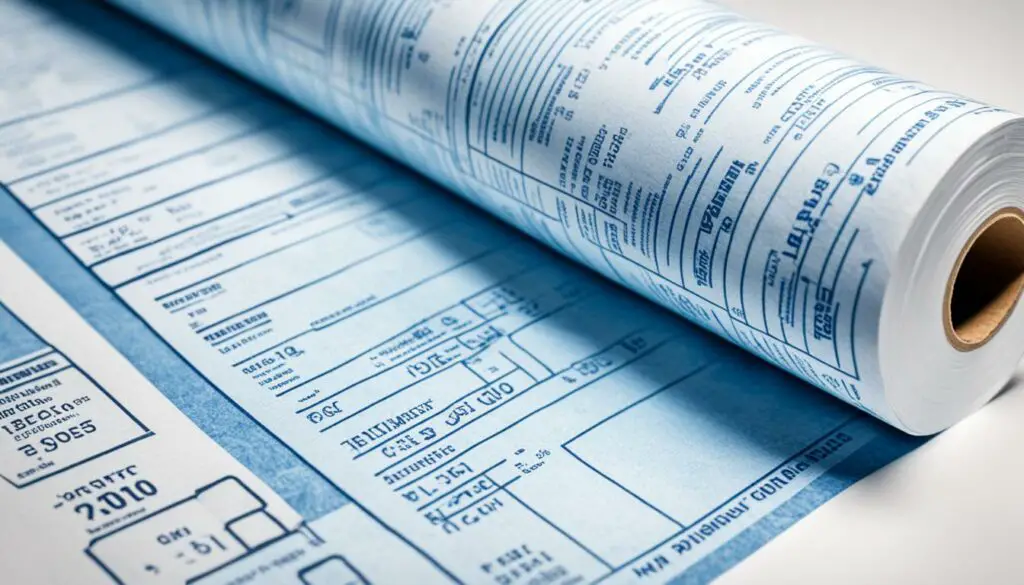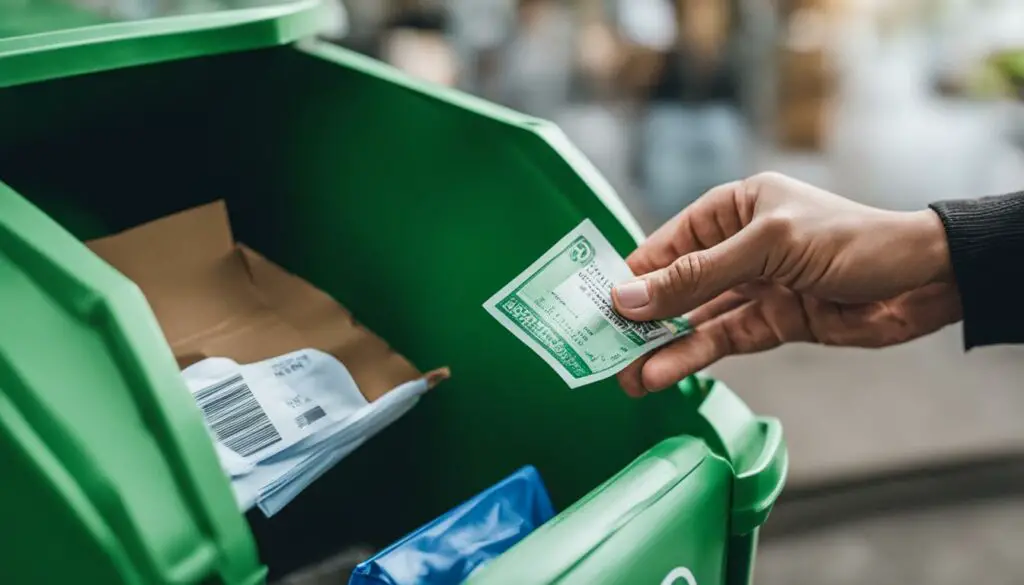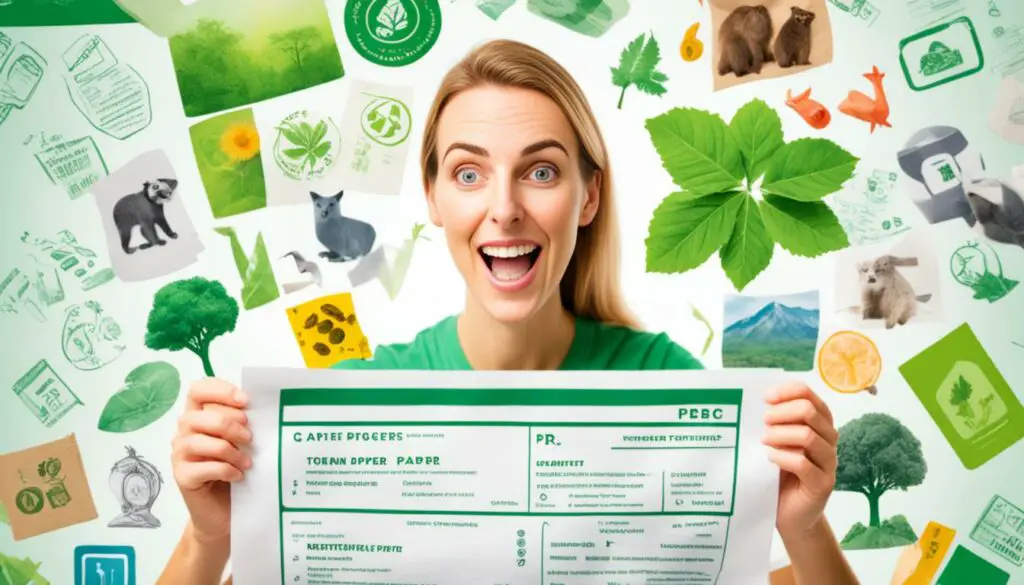Originally posted on February 10, 2024 @ 8:44 pm
When you finish your shopping at the grocery store, you’re often handed a receipt. But have you ever wondered if these receipts are recyclable?
Many people assume that paper receipts can be recycled like other paper products, but the truth is, most grocery store receipts are not recyclable. They are typically printed on thermal paper, which contains harmful chemicals like bisphenol-A (BPA) or bisphenol S (BPS). These chemicals cannot be easily removed during the recycling process, making it safest to throw receipts in the trash.
This is important for several reasons. Not only does it prevent the contamination of other paper products in the recycling stream, but it also safeguards the environment from the harmful effects of these chemicals. Thermal paper, which is found in most retail locations, cannot be recycled due to its BPA or BPS content. Burning or composting the receipts are also not viable options, as they would release the chemicals into the atmosphere or soil.
So, what should you do with your grocery store receipts? Read on to learn more about their environmental impact and responsible disposal methods.
Table of Contents
Key Takeaways:
- Grocery store receipts are typically printed on thermal paper, which contains harmful chemicals like BPA or BPS.
- These receipts cannot be easily recycled due to the chemicals in the thermal paper, so it is best to throw them in the trash.
- Thermal paper receipts contribute to deforestation, as over 300 billion paper receipts are produced globally each year.
- Opting for digital receipts and requesting retailers to switch to BPA-free thermal paper are sustainable alternatives to minimize receipt waste.
- The ultimate zero-waste solution is to refuse receipts whenever possible.
The Chemicals in Thermal Paper Receipts

Thermal paper receipts are commonly used in retail locations and utilize heat to display letters and numbers without the need for ink. However, to achieve this functionality, the paper is coated with chemicals such as bisphenol-A (BPA) or bisphenol S (BPS) in their “free form”. These chemicals have the potential to transfer to various surfaces that the receipt comes in contact with, including your hands, money, or groceries. It is important to handle thermal paper receipts with caution due to the potential health risks associated with the chemicals they contain.
BPA and BPS: Hormone Disruptors
Bisphenol-A (BPA) and bisphenol S (BPS) are chemicals commonly found in thermal paper receipts.
BPA and BPS are known hormone disruptors that can affect various aspects of health.
These chemicals can be absorbed through the skin or transferred to the mouth via food, posing potential risks.
Table: Health Risks of BPA and BPS
| Health Risks | Effects |
|---|---|
| Hormonal Imbalance | Disruption of endocrine system functionality |
| Reproductive Issues | Interference with fertility, menstrual cycle irregularities |
| Developmental Abnormalities | Potential impact on fetal and child development |
| Increased Cancer Risk | Possible association with certain cancers |
Given the potential risks associated with BPA and BPS, it is crucial to handle thermal paper receipts with care and consider alternative receipt management options to minimize exposure. The next section will discuss the environmental impact of receipts and sustainable alternatives to thermal paper.
The Environmental Impact of Receipts

Receipts may seem like small pieces of paper, but their environmental impact is significant. Let’s take a closer look at how the production and disposal of receipts contribute to deforestation and other environmental concerns.
Each year, over 300 billion paper receipts are produced globally, with the United States alone accounting for cutting down over 9.6 million trees. This massive amount of tree consumption is primarily fueled by the use of thermal paper, which is commonly used to print receipts.
Unfortunately, most receipts cannot be recycled due to the chemicals present in thermal paper. When thermal paper comes into contact with regular paper during the recycling process, it contaminates the natural paper, rendering it unsuitable for recycling. The shiny coating on thermal paper makes it challenging to recycle through traditional methods.
The Mathematics of Deforestation:
To better understand the environmental impact of receipts, let’s crunch some numbers:
| Environmental Impact | Statistics |
|---|---|
| Number of Paper Receipts Produced Annually | Over 300 billion globally |
| Trees Cut Down due to Receipt Production (U.S. Alone) | Over 9.6 million |
As we can see from the data, the sheer volume of paper receipts being produced results in the destruction of millions of trees, leading to deforestation on a significant scale.
The rampant deforestation caused by the production and disposal of receipts has far-reaching consequences. Forests play a crucial role in mitigating climate change, as they absorb carbon dioxide and release oxygen. By cutting down trees, we not only contribute to increased greenhouse gas emissions but also endanger countless species that rely on forests for their habitat.
It is crucial to be aware of the environmental impact of receipts and consider sustainable alternatives. By adopting digital receipts, requesting less paper usage, and encouraging businesses to switch to eco-friendly thermal paper options, we can significantly reduce deforestation and minimize our ecological footprint.
Image depicting the environmental impact of deforestation caused by the production of paper receipts.
Responsible Disposal of Receipts

The most sustainable way to manage receipts is to decline receiving them altogether. Opting for digital receipts, where possible, reduces the use of thermal paper and eliminates the need for physical receipts.
Many businesses can send receipts via email or text message for personal records. Not only does this reduce paper waste, but it also provides a convenient and easily accessible way to organize and track your expenses.
| Benefits of Digital Receipts | Benefits of Paper Receipts |
|---|---|
|
|
Disposing of Paper Receipts
If you still have paper receipts, the best option is to throw them in the trash. While not ideal, this prevents the chemicals in thermal paper from being recycled and made into new products.
Remember to separate any plastic or metallic attachments from paper receipts before disposing of them.
To further reduce waste, consider recycling other paper products such as newspapers, magazines, and cardboard separately. This ensures that the thermal paper receipts do not contaminate the recyclable paper materials during the recycling process.
Minimizing Receipt Waste
By taking steps to minimize receipt waste, you can reduce your carbon footprint and contribute to a more sustainable future.
- Opt for digital receipts whenever possible.
- Ask businesses if they offer digital receipt options.
- Keep a digital record of your transactions.
Choosing digital receipts over paper receipts not only reduces environmental impact but also helps streamline your financial organization. Responsible disposal of receipts is a simple yet effective way to make a positive difference in our world.
Alternatives to Thermal Paper Receipts

Instead of relying on thermal paper receipts, there are alternative options to consider. By exploring these alternatives, you can minimize the use of thermal paper and contribute to a more sustainable approach to managing receipts.
Opt for e-receipts:
Many businesses now offer the option to receive receipts digitally via email or text message. By choosing e-receipts where available, you eliminate the need for physical paper and reduce waste. Not only does this save the environment, but it also provides a convenient digital record of your transactions.
Use budget apps:
Another effective way to avoid paper receipts is by using budget apps to track your purchases manually. These apps allow you to input your expenses directly into your smartphone or computer, eliminating the need for paper receipts altogether. With the convenience of budget apps, you can easily keep track of your finances while reducing your environmental footprint.
By embracing these alternatives to thermal paper receipts, such as e-receipts and budget apps, you can make a positive impact on the environment and contribute to a more sustainable future.
The Importance of Asking for Change

If you require paper receipts for business purposes or frequently visit the same retailers, you can make a significant impact by requesting them to switch to BPA-free thermal paper. By voicing your concerns and suggesting this change, you not only contribute to creating a more sustainable and eco-friendly shopping experience, but also advocate for the health of cashiers who handle receipts regularly.
Switching to BPA-free thermal paper is a healthier option that benefits both the environment and human well-being. The replacement of bisphenol-A (BPA) with safer alternatives ensures that harmful chemicals are not present in the thermal paper. This change can reduce the risk of BPA exposure for both consumers and employees, promoting a healthier shopping environment.
By advocating for the switch to BPA-free thermal paper, you send a powerful message to retailers – urging them to prioritize sustainability and customer well-being. Your voice can inspire positive change and contribute to a more environmentally conscious retail industry.
“Switching to BPA-free thermal paper is a conscious choice that not only benefits the environment but also prioritizes the health and well-being of both customers and employees.”
Encouraging this shift is essential because it offers the opportunity to make a difference on a larger scale. By collectively requesting retailers to switch to BPA-free thermal paper, we create a demand for sustainable alternatives and influence industry practices. Your contribution can drive positive change and help build a more eco-friendly future.
Benefits of Switching to BPA-free Thermal Paper
| Benefits | Description |
|---|---|
| 1. Environmental Sustainability | BPA-free thermal paper reduces the environmental impact associated with traditional paper receipts, such as deforestation and chemical contamination in the recycling stream. |
| 2. Healthier Shopping Experience | Switching to BPA-free thermal paper eliminates the risk of exposure to harmful chemicals like BPA, ensuring a safer shopping environment for all. |
| 3. Industry Transformation | By advocating for change, you encourage retailers to adopt more sustainable practices, influencing the entire retail industry towards eco-friendly alternatives. |
The Ultimate Zero-Waste Solution
When it comes to managing receipts, the ultimate zero-waste solution is to refuse them whenever possible. By making a conscious effort to refuse before you consider other options, you can significantly reduce the amount of paper waste generated. This simple step is the first and most crucial part of the zero-waste hierarchy: refuse, reduce, reuse, recycle, and rot.
By refusing receipts, you eliminate the need for paper altogether. Not only does this reduce waste, but it also decreases the demand for thermal paper, which contributes to deforestation. By refusing unnecessary receipts, you are taking an active stand against the environmental impact caused by the production and disposal of paper receipts.
The Zero-Waste Hierarchy
Let’s take a closer look at the different steps of the zero-waste hierarchy and how they can be applied to receipt management:
- Refuse: Refusing receipts is the most effective way to prevent waste. Politely decline a receipt when making purchases, especially when they are unnecessary for your records.
- Reduce: If you do need a receipt for certain transactions, be mindful of the quantity you take. Only accept receipts when essential, such as for tax purposes or warranty claims. Minimize the number of receipts you accumulate to minimize waste.
- Reuse: Explore ways to reuse receipts whenever possible. For example, you can use the back of receipts as scratch paper or shopping lists.
- Recycle: If you have paper receipts that cannot be refused or reused, check if they can be recycled in your local area. However, be cautious that most thermal paper receipts cannot be recycled due to the chemicals they contain.
- Rot: If you receive organic or food-related receipts, such as those from farmers’ markets, they may be suitable for composting. Check if your local composting facilities accept paper receipts.
By following the zero-waste hierarchy and refusing receipts as the first step, you can reduce your environmental impact and contribute to a more sustainable future.
| Step | Description |
|---|---|
| Refuse | Politely decline unnecessary receipts |
| Reduce | Limit the number of receipts you accept |
| Reuse | Find creative ways to use receipts again |
| Recycle | Check if your local recycling facilities accept receipts |
| Rot | Compost food-related receipts if possible |
The Impact of Receipts on Landfills
When it comes to the disposal of receipts, throwing them in the trash may not be the most eco-friendly option. However, it does serve the purpose of preventing harmful chemicals like bisphenol-A (BPA) from leaching into the environment. BPA is commonly found in thermal paper receipts and can pose a risk when it ends up in landfills.
Landfills are designed to contain waste, but they are not foolproof in preventing contamination. Over time, the chemicals present in receipts can seep into the soil, contaminating the surrounding area. This can have detrimental effects on plant and animal life, as well as the overall ecosystem.
Furthermore, BPA leaching from receipts can also find its way into groundwater, which is a primary source of drinking water for many communities. This poses a potential threat to human health, as exposure to BPA has been linked to various health issues, including hormone disruption.
“Receipts containing BPA can contaminate landfills, soil, water, and air, contributing to environmental pollution and potential health risks.”
It is important to be aware of the impact of receipts on landfills and take steps to handle and dispose of them responsibly. While throwing receipts in the trash may be necessary to prevent BPA leaching, it is crucial to explore alternative options and reduce the overall reliance on thermal paper receipts.
To visually represent the impact of receipts on landfills, refer to the table below:
| Impact on Landfills | Effects |
|---|---|
| Contamination of Soil | BPA leaching from receipts can contaminate the soil, affecting plant growth and overall ecosystem health. |
| Water Pollution | Receipts in landfills can release BPA into groundwater, potentially contaminating drinking water sources. |
| Air Pollution | BPA release from landfills contributes to air pollution, affecting air quality and potentially causing health issues. |
By understanding the impact of receipts on landfills, individuals can make informed decisions and advocate for more sustainable receipt management practices.
Conclusion
In conclusion, it is important to note that most grocery store receipts cannot be recycled due to the harmful chemicals present in thermal paper. Bisphenol-A (BPA) and bisphenol S (BPS) are commonly found in these receipts, posing risks to both human health and the environment. To prevent contamination of other paper products in the recycling stream, it is best to throw receipts in the trash rather than attempting to recycle them.
However, there are alternative options that can help minimize the use of traditional receipts. Opting for digital receipts, where possible, reduces the need for physical paper and waste. Many businesses offer the convenience of sending receipts via email or text message, providing a digital record of transactions. Additionally, requesting retailers to switch to BPA-free thermal paper can contribute to a more sustainable approach.
By being mindful of how we manage and dispose of receipts, we can make a positive impact on the environment and work towards a more sustainable future. Choosing digital receipts and advocating for change in the use of thermal paper are viable options that can help reduce waste and minimize the harmful effects of grocery store receipts. Together, we can make a difference in preserving our planet for future generations.
FAQ
Are grocery store receipts recyclable?
Most grocery store receipts are not recyclable due to the chemicals in thermal paper. It is best to throw receipts in the trash to prevent contamination of other paper products in the recycling stream.
What chemicals are in thermal paper receipts?
Thermal paper receipts contain chemicals like bisphenol-A (BPA) or bisphenol S (BPS). These chemicals are harmful to human health and the environment.
What is the environmental impact of receipts?
Receipts, especially those made of thermal paper, contribute to deforestation. Over 9.6 million trees are cut down in the U.S. alone each year to produce paper receipts.
How should I dispose of receipts responsibly?
It is best to throw receipts in the trash. While not ideal, this prevents the chemicals in thermal paper from contaminating the recycling stream. Opting for digital receipts is also a sustainable option.
What are the alternatives to thermal paper receipts?
Instead of traditional paper receipts, you can opt for e-receipts where available. Many businesses offer the option to receive receipts via email or text message, reducing waste and the use of thermal paper. Budget apps can also track purchases without the need for paper receipts.
Can I request businesses to switch to BPA-free thermal paper?
Yes, you can voice your concerns and request businesses to switch to BPA-free thermal paper. This healthier option benefits the environment and the health of cashiers who handle receipts regularly.
What is the ultimate zero-waste solution for receipt management?
The ultimate zero-waste solution is to refuse receipts whenever possible. By refusing before you reduce, reuse, recycle, and rot, you eliminate the need for paper receipts altogether.
What is the impact of receipts on landfills?
When receipts containing BPA end up in landfills, the chemical can contaminate the soil, water, and air. It is important to handle and dispose of receipts responsibly to prevent harm to the environment.
Source Links
- https://www.treehugger.com/can-receipts-be-recycled-5072255
- https://recyclecoach.com/blog/the-problem-with-recycling-receipts/
- https://brightly.eco/blog/are-receipts-recyclable
See also:
Leave a Reply